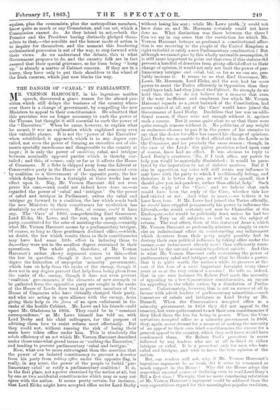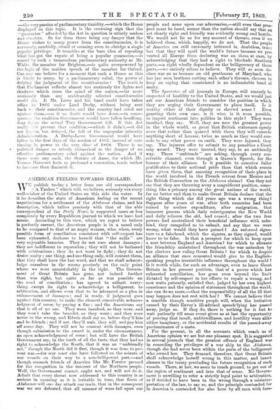THE DANGER OF "CABAL " IN PARLIAMENT.
MR. VERNON HARCOURT, in his ingenious maiden speech, discovered a grave reason for the absurd provision which still delays the business of the country whenever there is a change of government, by compelling the new Ministers to appeal to their constituencies. He admitted that this provision was no longer necessary to curb the power of the Throne, but thought it still essential to curb the power of the "Executive." When he came, however, to explain what he meant, it was an explanation which explained away even this valuable phrase. It is not the power of the Executive' when established, it appeared, which is in any degree curtailed, nor even the power of forming an executive out of elements specially unwelcome and disagreeable to the country at large ; it is only the power of coalition, cabal, and intrigue between nominally opposed parties which is thereby curtailed ; and this, of course, only so far as it affects the House of Commons. If a flake is chipped away from the Liberal or Conservative party in the House of Lords, and cemented even by coalition to a Government of the opposite party, the law which delays business for a fortnight or three weeks has no effect upon it. Nay, Mr. Vernon Harcourt did not even prove his case,—and could not indeed have done so,—as regarded the power of cabal' and intrigue.' On the power of cabal and intrigue in Parliament, unless the cabal and intrigue go forward to a coalition, the law which sends back the new Ministers to their constituents for re-election has absolutely no effect whatever. Nor, of course, could it have any. The Cave' of 1866, comprehending Earl Grosvenor, .Lord Elcho, Mr. Lowe, and the rest, was a party within a party, constituted for the sake of assisting the enemy,—exactly what Mr. Vernon Harcourt means by a parliamentary intrigue. Of course, so long as these gentlemen declined office,—which, no doubt, the law which remits them to their constituencies may have had some little effect in inducing them to do,—they were not in the smallest degree restrained in their
operations. The whole pith, therefore, of Mr. Vernon Harcourt's rather showy argument comes to this, that the law in question, though it does not prevent in any degree the formation of unpopular minority ' governments, which lean on help from the ranks of the enemy, though it does not in any degree prevent that help from being given from the ranks of the enemy, though it does not even prevent 'coalition' governments, if the elements of new strength to be gathered from the opposition party are sought in the ranks of the House of Lords, does tend to prevent members of the House of Commons who have virtually changed their party, and who are acting in open alliance with the enemy, from giving their help in the form of an open enlistment in the ranks of the hostile Cabinet. Mr. Lowe and his friends could upset Mr. Gladstone in 1866. They could be in " constant correspondence," as Mr. Lowe himself has told us, with Lord Derby and his chief colleagues, for the purpose of advising them how to resist reform most effectually. But they could not, without running the risk of losing their seats have taken office under him. This is absolutely the whole efficiency of an act which Mr. Vernon Harcourt described under those somewhat grand terms as "curbing the Executive," and tending to prevent parliamentary cabal and intrigue.'
Now, what can be more extravagant than the assertion that the power of an isolated constituency to prevent a deserter from his party from taking office under the opposite flag, is really, in any sense, the power of the people to forbid 'parliamentary cabal' or ratify a parliamentary coalition? It is, in the first place, not a power exercised by the nation at all, but by, one or two accidental constituencies which may or may not agree with the nation. It seems pretty certain, for instance, that Lord Elcho might have accepted office under Lord Derby without losing his seat ; while Mr. Lowe probUy could not have done so, and Mr. Horsman certainly could not have done so. What distinction was there between the three ? Can we say in any sense that the restriction for which Mr. Vernon Harcourt betrays so profound a constitutional affection is one reserving to the people of the United Kingdom a right to forbid or ratify a new Parliamentary combination ? But although we cannot pass by this wholly untenable assumption, it is still more important to point out that even if this statute did prevent a handful of deserters from giving official effect to their change of opinion, it would not only not limit the power of parliamentary intrigue and cabal, but, so far as we can see, probably increase it. It seems to us that Earl Grosvenor, Mr. Lowe, Mr. Horsman, Lord Elcho, and the rest, had far more power to assist the Tories efficiently in Opposition than they could have had, had they joined the Cabinet. So strongly do we hold this, that we do not believe for a moment that even if the very inefficient and cumbrous law which Mr. Vernon Harcourt regards as a great bulwark of the Constitution, had never existed at all. any of the ' Cave' would have joined the Government of Lord Derby. Doubtless that law was an additional reason, if there were not enough without it, against such a course. But it seems quite clear to us that there were quite enough reasons without it. No politician of any weight or eminence chooses to put it in the power of his enemies to say that the desire for office has caused his change of opinions. Lord Derby was as unable to find official aid in the Lords as in the Commons, and for precisely the same reason ; though, in the case of the Lords, the paltry provision relied upon cane of course, have had no effect. It was obvious to reply to Lord Derby's overtures, 'No, if I took office, my power to help you would be materially diminished ; it would be paralyzed by the imputation to me of sinister motives. But if I stay in opposition, my voice will still retain any influence it may have with the party to which I traditionally belong, and therefore it is better for you, as well as for myself, that I should give you independent, rather than official, help.' Such was the reply of the Cave.' and we believe that such would have been the reply of the Cave, whether this law had existed or not. And what is more,—we believe it to have been true. If Mr. Lowe had joined the Tories officially, he would have crippled permanently his power to influenctithe Liberals,—he would certainly not now be Chancellor of the Exchequer,—he would be politically dead, unless he had become a Tory on all subjects, as well as on the subject of reform. The real effect, then, of this statute of Anne's, which Mr. Vernon Harcourt so profoundly admires, is simply to exercise an infinitesimal effect in counteracting any inducement which deserters from their party might possibly feel to destroy their own political influence by taking office under the enemy,—an inducement already more than sufficiently counteracted by the natural aversion to political suicide. And this is what Mr. Vernon Harcourt calls restraining the power of parliamentary cabal and intrigue, and what he thinks a power, that it is quite worth the nation's while to preserve at the cost of the loss of a most important fortnight every three years or so at the very crisis of a session ! Ile tells us, indeed, that in one rare instance Sir Robert Peel made the necessity of appealing to a few Conservative constituencies, an excuse for appealing to the whole nation by a dissolution of Parliament. Unfortunately, however, that is not an excuse at all in favour with adroit leaders of parliamentary minorities,—such fomentors of cabals and intrigues as Lord Derby or Mr. Disraeli. When the Conservatives accepted office as a minority government in 1858 they did not appeal to the country, but were quite content to ask their own constituencies if they liked them the less for being in power. When the Conservatives accepted office as a minority government in 1866, they, again, never dreamt for a moment of making the necessity of an appeal to their own tried constituencies the excuse for a general appeal to the country, which they well knew would have
condemned them. Sir Robert Peel's precedent is never followed by any leaders who are at all inclined to either intrigue or cabal. It is a precedent only for men who hats cabal and intrigue, and wish to know the true opinion of the nation.
But., our readers will ask, why. if Mr. Vernon Harcourt's ingenious argument be so weak, did it seem to command so much support in the House ? Why did the House adopt the somewhat unusual course of declining even to read Lord Bury's Bill a first time ? We reply. that no more convincing refutation of Mr. Vernon Harcourt's argument could be adduced than the very superstitious regard for this meaningless popular tradition, —the very passion of parliamentary timidity,—which the House displayed on this topic. It is the crowning sign that the " guarantee " afforded by the Act in question is utterly useless and obsolete. So far from there being any danger that the House wishes to usurp power from the constituencies, it is nervously, morbidly, afraid of seeming even to abridge a single popular privilege. It trembles at the bare idea of repealing what has got the repute of being a popular guarantee,—is scared by such a tremendous parliamentary authority as Mr. White, the member for Brighton,—is quite overpowered by the logic of the maiden speech of the member for Oxford. Can any one believe for a moment that such a House as this is likely to usurp, by a parliamentary cabal, the power of defying the judgment of the constituencies ? The truth is that Parliament reflects almost too anxiously the lights and shadows which cross the mind of the nation,—far more anxiously than any accidentally selected constituencies could do. If Mr. Lowe and his band could have taken office in 1866 under Lord Derby, without being sent back to their constituencies, and the country had cried out against them,—as it no doubt would have done,—in consequence, the coalition Government would have fallen headlong, long bv;,re the actual Tory Government fell. If this Act really did prevent that coalition,—which it didn't,—it did not lia,'en, but delayed, the fall of the unpopular minority Administration. A Derby-Lowe Government would have fallen in the first days of the session of 1867, instead of continuing in power to the very close of 1868. There is no • political danger so utterly chimerical as the danger of an effective parliamentary cabal against the nation. And if there were any such, the Statute of Anne, for which Mr. Vernon Harcourt feels so profound a veneration, tends rather to increase than diminish it.



































 Previous page
Previous page